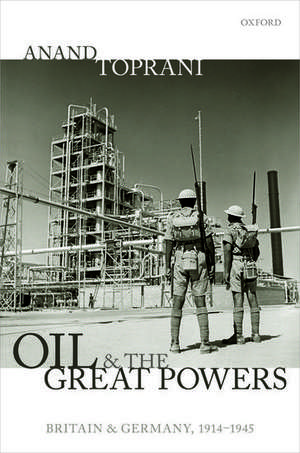Oil and the Great Powers: Britain and Germany, 1914 to 1945
Autor Anand Topranien Limba Engleză Hardback – 9 apr 2019
Preț: 591.23 lei
Preț vechi: 784.89 lei
-25% Nou
Puncte Express: 887
Preț estimativ în valută:
113.14€ • 117.41$ • 94.57£
113.14€ • 117.41$ • 94.57£
Carte tipărită la comandă
Livrare economică 06-12 martie
Preluare comenzi: 021 569.72.76
Specificații
ISBN-13: 9780198834601
ISBN-10: 0198834608
Pagini: 324
Ilustrații: 21 black and white figures/maps
Dimensiuni: 163 x 240 x 24 mm
Greutate: 0.77 kg
Editura: OUP OXFORD
Colecția OUP Oxford
Locul publicării:Oxford, United Kingdom
ISBN-10: 0198834608
Pagini: 324
Ilustrații: 21 black and white figures/maps
Dimensiuni: 163 x 240 x 24 mm
Greutate: 0.77 kg
Editura: OUP OXFORD
Colecția OUP Oxford
Locul publicării:Oxford, United Kingdom
Recenzii
Anand Toprani has canvassed a broad range of materials in British, German, and American archives.
Oil and the Great Powers is masterful in its description of the geopolitical threats to autonomy that each nation faced, as well as the influence of commercial actors on diplomacy...Toprani writes well, has an eagle eye for the telling quote or statistic, and vigorously analyzes the major military, diplomatic, and economic issues that shaped German and British policy. Oil and the Great Powers is a significant and sophisticated contribution to the history of oil and diplomacy, and it helps us understand why that natural resource was and remains so indispensable in war and peace.
In his well-researched and carefully crafted study of British and German oil policies from the beginning of the First World War to the end of the Second, which emerged from a dissertation written under the guidance of David Painter at Georgetown University, Anand Toprani partly resists these temptations while also (intentionally) succumbing to other aspects of them. The result is a valuable study that makes an important contribution to the history of energy and Great Power conflicts in the inter-war period.
Anand Toprani's Oil and the Great Powers successfully interlaces scholarship on Germany and Britain during the war with work on oil politics more broadly. In doing so, it shows the value of such integrated histories that complicate yet enrich traditional understandings of key historical and geopolitical events. It stresses how international relations shaped each state's approach to oil and vice versa. More importantly, this work will hopefully serve as an impetus for a continuing examination of oil and other energy resources in order to further develop our understanding of crucial historical issues.
Toprani's book is a fine contribution to our understanding of why Britain lost its hegemony, Germany was never able to take it, and America was.
Oil and the Great Powers is masterful in its description of the geopolitical threats to autonomy that each nation faced, as well as the influence of commercial actors on diplomacy...Toprani writes well, has an eagle eye for the telling quote or statistic, and vigorously analyzes the major military, diplomatic, and economic issues that shaped German and British policy. Oil and the Great Powers is a significant and sophisticated contribution to the history of oil and diplomacy, and it helps us understand why that natural resource was and remains so indispensable in war and peace.
In his well-researched and carefully crafted study of British and German oil policies from the beginning of the First World War to the end of the Second, which emerged from a dissertation written under the guidance of David Painter at Georgetown University, Anand Toprani partly resists these temptations while also (intentionally) succumbing to other aspects of them. The result is a valuable study that makes an important contribution to the history of energy and Great Power conflicts in the inter-war period.
Anand Toprani's Oil and the Great Powers successfully interlaces scholarship on Germany and Britain during the war with work on oil politics more broadly. In doing so, it shows the value of such integrated histories that complicate yet enrich traditional understandings of key historical and geopolitical events. It stresses how international relations shaped each state's approach to oil and vice versa. More importantly, this work will hopefully serve as an impetus for a continuing examination of oil and other energy resources in order to further develop our understanding of crucial historical issues.
Toprani's book is a fine contribution to our understanding of why Britain lost its hegemony, Germany was never able to take it, and America was.
Notă biografică
Anand Toprani is an Assistant Professor of Strategy and Policy at the US Naval War College, where he specializes in diplomatic and military history, energy geopolitics, and political economy. He is a graduate of Cornell, Oxford, and Georgetown, and held fellowships at Yale and Harvard. He previously served as an historian with the US Department of State and as an intelligence analyst at US Central Command.
